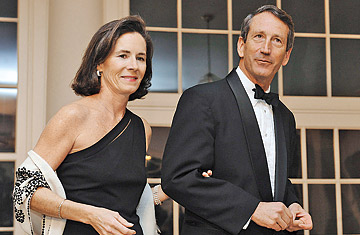
South Carolina Governor Mark Sanford arrives with his wife Jenny at a White House dinner held by President Obama for the National Governors Association on Feb. 22, 2009
(4 of 7)
The consequences for more-affluent kids tend to be far less devastating than for poor ones; they are less likely to become teenage parents and high school dropouts. But children of divorced middle-class parents do less well in school and at college compared with underprivileged kids from two-parent households. "There's a 'sleeper effect' to divorce that we are just beginning to understand," says David Blankenhorn, president of the Institute for American Values. It is an effect that pioneering scholars like McLanahan and Judith Wallerstein have devoted their careers to studying, revealing truths that many of us may find uncomfortable. It's dismissive of the human experience, says Blankenhorn, to suggest that kids don't suffer, extraordinarily, from divorce: "Children have a primal need to know who they are, to love and be loved by the two people whose physical union brought them here. To lose that connection, that sense of identity, is to experience a wound that no child-support check or fancy school can ever heal."
Put a Ring on It
That prompts the question, does the father have to actually be married to the mother of his children to have a positive effect on them?
"Not if he behaves exactly like a married man," says Robert Rector, a senior research fellow of domestic policy at the Heritage Foundation. If a man is willing to contribute 70% of his income to the child's upbringing, dedicate himself around the clock to the child's well-being and create a stable home life--a home life that includes his actually living there with mother and child--he might be able to give his child the boon of fatherhood without having to tie the knot. But that rarely happens. When children are born into a co-habiting, unmarried relationship, says Rector, "they arrive in a family in which the principals haven't resolved their most basic issues," including those of sexual fidelity and how to share responsibilities. Let a little stress enter the picture--and what is more stressful than a baby?--and things start to fall apart. The new mother starts to make wifelike demands on the man, and without the commitment of marriage, he is soon out the door.
